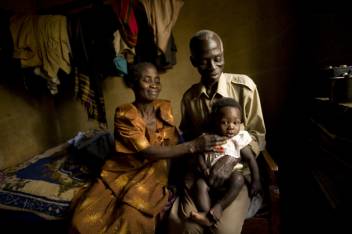Last week, I attended AIDS 2012 in Washington DC. Along with me and HIV Policy Advisor, Rachel Albone, other HelpAge staff working on HIV, from our partner organisations, were also present at the conference.
Immediately, I felt there was more of a sense of empowerment than the similar conference I attended in Toronto six years ago and this is testimony to the efforts of activists and the HIV community.
of a sense of empowerment than the similar conference I attended in Toronto six years ago and this is testimony to the efforts of activists and the HIV community.
As with every issue and every conference, you take away positives and negatives. With eight million people living with HIV and AIDS now receiving antiretroviral therapy (ART), the AIDS pandemic continues to benefit from exceptional treatment and medical development. However, there still remains a gap of another six million people.
The problem is countries won’t provide enough of their own money to keep increasing the amount of treatment. And although there are significant scientific developments on treatment possibilities, making the best medicines available to poor countries will be a challenge.
HelpAge at AIDS 2012
It is very worrying that gender inequalities and the stigma linked to HIV and AIDS continue to undermine the rights of older women. We showed our new animation on how HIV impacts the lives of older women at the session too. If you haven’t watched it already, do! I had the chance to interact with older women and listen to their stories. Their accounts of rape and land grabbing really brought the issues highlighted in the video home.
We also had the opportunity to promote our new peer education manual for older people, as well as other materials on caring and income generation at our HIV and Ageing booth, which we shared with Terrance Higgins Trust and ACRIA.
Role of caregivers
Those who care for loved ones with HIV or children who have lost their parents to HIV and AIDS, continue to face huge daily life challenges. These are linked to poverty, discrimination, their own HIV status in some cases, and concerns for the children they care for.
The care agenda was an issue that came up at the conference as the HIV and AIDS community knows that supplying drugs is not enough. The new Orphans and Vulnerable Children (OVC) guidelines by the President’s Emergency Plan for AIDS Relief (PEPFAR), although did not pay attention to data of older people and HIV, had some good elements including:
• highlighting the importance of the family who cares for orphans and vulnerable children
• recognising that giving financial support to caregivers is crucial if they are to keep on their roles as carers.
Including older people in HIV statistics
We need to collaborate with researchers and activists across the globe who are working on the issue of HIV and ageing. This will bring attention to the role of older people as caregivers and simply as a growing proportion of people living with HIV worldwide.
Ending on a more positive note, ageing and HIV is very much on the core global AIDS map and featured quite a lot in the conference, which was very encouraging. This is an opportunity to ensure we can support older people affected by HIV and AIDS through our work with better policies and programmes.
